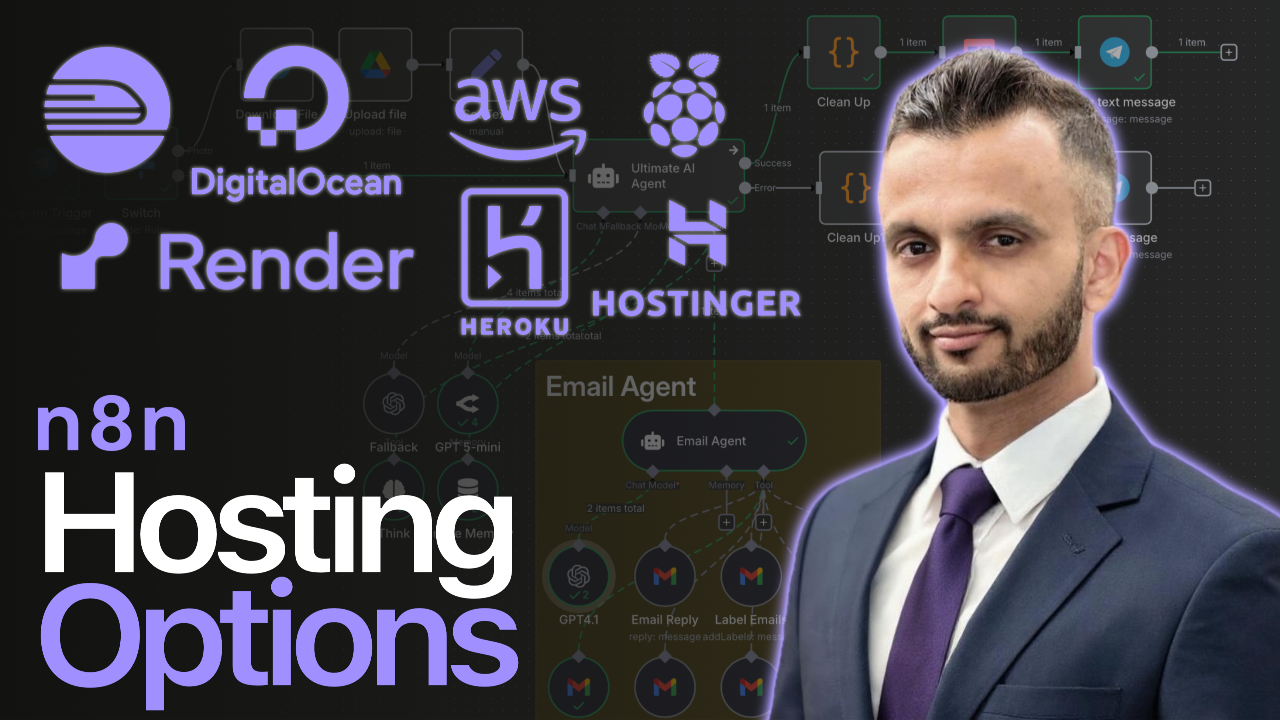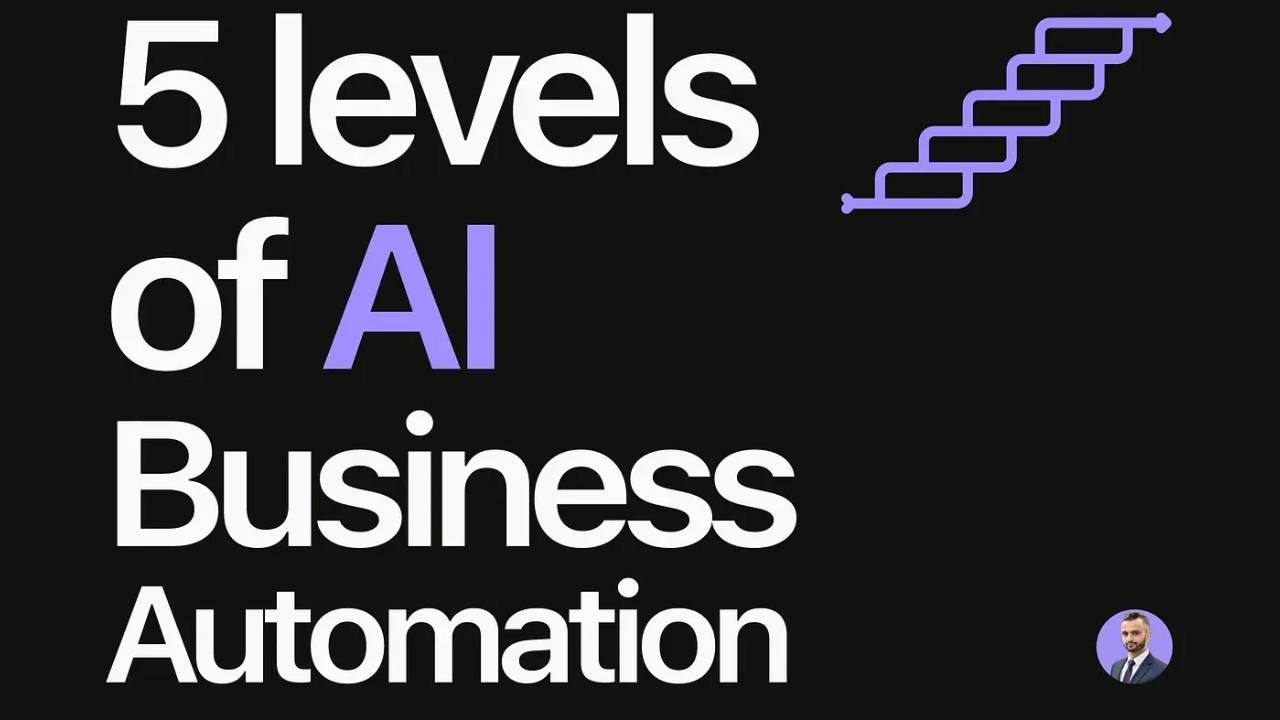Top 10 n8n Self-Hosting Solutions
Oct 06, 2025
Choosing where to host your n8n instance is more than a technical decision; it is the foundation for your entire automation engine. The right platform supports your journey from simple, Level 2 process automation to integrated, Level 4 systems. Self-hosting gives you full control and can be significantly cheaper than the official n8n cloud plan, but it requires the right choice for your technical comfort and goals.

Here is a practical list of the top 10 self-hosting solutions, breaking down the real-world pros, cons, and costs of each.
1. Railway
- Pros: Extremely fast deployment. It integrates with Git and provides automatic HTTPS and a domain, making it perfect for quick tests.
- Cons: The 1 GB of disk space is a major limitation for anything beyond simple trials. Usage-based billing can become unpredictable after the initial free credits are used.
- Pricing: Starts with a $5 credit for the first month; paid plans begin at around $5/month.
2. Render
- Pros: Simple to use with managed infrastructure, free TLS certificates, and auto-deployment from GitHub. It also supports persistent disks, which is a key advantage over some competitors.
- Cons: The free tier server sleeps after inactivity, requiring a separate ping service to keep it online. Paid plans start at $7/month but have separate charges for database and storage.
- Pricing: Free tier available; paid plans start at $7/month.
3. DigitalOcean
- Pros: An affordable and scalable option starting at $5/month. You get full root access, and the large community and official n8n template make setup straightforward.
- Cons: Requires a working knowledge of Linux and Docker. Unlike managed services, you are responsible for all setup and ongoing maintenance.
- Pricing: Starts at $5/month for a basic “droplet.”
4. Heroku
- Pros: Beginner-friendly platform with a simple Git-based deployment workflow and a large ecosystem of add-ons.
- Cons: There is no permanent free tier. The filesystem is ephemeral, limiting data persistence, and a production-ready setup can cost over $50/month.
- Pricing: Hobby plans start at $7/month.
5. Hostinger VPS
- Pros: An affordable VPS with a beginner-friendly control panel and solid performance. The 30-day money-back guarantee makes it a low-risk choice.
- Cons: It has fewer global data centers than major cloud providers and offers less flexibility. Manual setup is required.
- Pricing: Plans start around $3–$8/month.
6. Hetzner
- Pros: Delivers excellent performance for the price, with powerful hardware and strong European data centers.
- Cons: This option is for those comfortable with system administration. It requires Linux skills and provides limited support.
- Pricing: A VPS starts at around €3.79 (~$4)/month.
7. Google Cloud
- Pros: Offers a strong global infrastructure and an always-free tier. It integrates well with managed databases and container services like Cloud Run.
- Cons: The free tier is limited to 0.5 GB of RAM and, more critically, only 1 GB of outbound traffic per month. The pricing structure is complex, and setup can be challenging.
- Pricing: Free tier with a $300 credit for 90 days, then pay-as-you-go.
8. Oracle Cloud
- Pros: The perpetual free tier includes two AMD-based compute VMs, offering good performance for small workloads at no cost.
- Cons: The registration process is notoriously difficult and geared toward corporate users. Setup is complex, and community support is limited.
- Pricing: The “Always Free” tier includes two small VMs with 1 GB of RAM each.
9. Local Computer or Raspberry Pi 5
- Pros: Completely free, aside from the hardware cost. It gives you full control and is excellent for learning, testing, or internal-only automations.
- Cons: Your n8n instance only runs when the device is on. It requires technical setup for networking and Docker, and sharing webhooks or external access is difficult.
- Pricing: The cost of the hardware.
10. Amazon Web Services (AWS)
- Pros: A highly scalable, pay-as-you-go platform with a rich ecosystem of services, including managed databases (RDS) and container orchestration (ECS).
- Cons: The pricing and setup are complex. Costs can escalate quickly if not monitored carefully, and the initial configuration can be tricky for beginners.
- Pricing: Free for 12 months with a t2.micro instance (1 vCPU, 1 GB RAM), then pay-as-you-go.
Making the Right Choice for Your Stage
- For quick tests and validation: Railway or Render offer the fastest setup.
- For scalable, production systems: DigitalOcean, Hetzner, or AWS are solid choices if you have the technical skills.
- For a budget-friendly VPS: Hostinger and Hetzner provide good specifications at a low cost.
- For learning and experimentation: Hosting locally on your computer or a Raspberry Pi is free and flexible but not suitable for production.
Each option presents a different balance of ease of use, cost, performance, and control. Your choice should reflect your technical comfort, budget, and the scale of your automation needs.
I personally host n8n on my own Raspberry Pi 5 Server. It’s powerful enough and I have control over it and it’s free.
Want my full n8n self-hosting comparison, or need a no-BS setup plan for your business workflows? Comment AUTOMATION Downbelow and I’ll send you my free templates.
Here are also the AI Systems & @n8n templates that you can use to go Level 1 to Level 5 Business Autonomy — https://www.augmentedstartups.com/ai-business-systems-framework
Ritesh Kanjee | Augmented AI

From 80-Hour Weeks to 4-Hour Workflows
Get my Corporate Automation Starter Pack and discover how I automated my way from burnout to freedom. Includes the AI maturity audit + ready-to-deploy n8n workflows that save hours every day.
We hate SPAM. We will never sell your information, for any reason.




